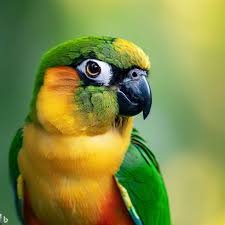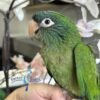Uncategorized
Understanding the Conure Bird: A Comprehensive Guide
Conure birds are a popular choice for pet enthusiasts, thanks to their vibrant colors, energetic personalities, and intelligence. These birds come in various species, each with its unique traits, and one of the most notable among them is the black cap conure. In this article, we will dive deep into the world of conures, highlighting their characteristics, care requirements, and, in particular, the black cap conure. By the end, you’ll have a well-rounded understanding of what makes these birds so special.
1. Introduction to Conure Birds
What Are Conure Birds?
Conure birds belong to the parrot family and are known for their striking colors and playful nature. Originating from Central and South America, they inhabit tropical forests, woodlands, and savannas. These birds have become highly popular as pets due to their sociable behavior and ability to form strong bonds with their owners.
Conures range in size, with some being as small as 9 inches, while others can grow up to 15 inches in length. Their tails are long and pointed, contributing to their sleek appearance. Known for their curiosity and energetic play, conures need mental stimulation and interaction to remain happy.
Types of Conure Birds
There are numerous types of conure bird each with distinct features. Some of the most common include:
- Green Cheek Conure
- Sun Conure
- Jenday Conure
- Nanday Conure
- Black Cap Conure
Each type of conure has unique traits, such as color variations, sizes, and temperament. Among these, the black cap conure stands out due to its unique appearance and distinct personality, which we will explore later.
Personality and Temperament of Conures
Conures are known for their playful and affectionate personalities. They are intelligent and capable of mimicking sounds, though their ability to talk is generally not as advanced as some other parrot species. What they lack in speech, they make up for with their expressive body language, chirping, and other vocalizations.
Conures can be cheeky and enjoy exploring their surroundings. Their playful antics can be highly entertaining, but they can also be mischievous if not properly trained. These birds thrive on social interaction, making them excellent companions for individuals who can devote time to their care.
2. Black Cap Conure: A Special Species
Physical Appearance
The black cap conure (Pyrrhura rupicola), also known as the black-capped parakeet, is a small conure species. It is primarily green but is distinguished by its striking black “cap” that covers its head and forehead. This dark marking contrasts beautifully with its green body, giving the bird its name.
Their bodies are predominantly green with subtle shades of red on the belly and under the tail. The feathers near the wings have a bluish tint, adding to their vibrant appearance. Black cap conures are relatively small, measuring about 10 inches from beak to tail, making them one of the more compact conure species.
Habitat and Origin
Black cap conures are native to the forested regions of South America, particularly in countries like Peru and Bolivia. In the wild, they can be found in humid, subtropical forests where they live in flocks. Their natural habitat is threatened by deforestation, though their numbers remain stable for now.
In captivity, these birds are known to adapt well to domestic environments, provided they have enough space and stimulation.
Personality and Behavior
The black cap conure is known for its lively and energetic demeanor. It is one of the quieter conure species, making it a more suitable option for individuals who may be sensitive to noise. Although they can still make sounds and occasional squawks, they are not as loud as other conures like the sun conure.
These birds are also highly affectionate, bonding closely with their owners. Black cap conures love being held, scratched, and played with, making them an ideal pet for families or individuals seeking a loving and interactive bird. Their intelligent and curious nature requires plenty of toys and activities to prevent boredom.
3. Black Cap Conure as a Pet: Care and Maintenance
Cage Requirements
When keeping a black cap conure as a pet, it is crucial to provide a spacious and well-structured cage. Since these birds are highly active, they need enough room to move around, climb, and explore. A cage that measures at least 24 inches in height, width, and depth is ideal.
Ensure the cage has horizontal bars to allow for climbing, and provide multiple perches of different sizes and materials. Conures also enjoy swings and ladders, which will help keep them entertained.
Diet and Nutrition
A well-balanced diet is essential to keep your black cap conure healthy. In the wild, these birds feed on a variety of fruits, seeds, and vegetation. In captivity, their diet should consist of:
- High-quality pellets: These should form the basis of their diet, providing essential vitamins and nutrients.
- Fresh fruits and vegetables: Offer them a wide range of fresh produce such as apples, berries, carrots, and leafy greens. Make sure to avoid avocado, as it is toxic to birds.
- Seeds and nuts: While they enjoy seeds and nuts, these should be given in moderation due to their high-fat content.
Provide fresh water daily, and ensure that food dishes are cleaned regularly to prevent contamination.
Social Interaction and Mental Stimulation
Black cap conures thrive on interaction and play. They are highly social birds that form strong bonds with their owners, so it’s crucial to spend quality time with them daily. Activities such as training sessions, teaching them tricks, or simple playtime help keep them engaged and mentally stimulated.
Providing a variety of toys is another way to ensure they don’t become bored or stressed. Rotate toys regularly to keep things interesting, and include puzzle toys that challenge their intelligence.
Grooming and Health
Regular grooming is essential for keeping your black cap conure healthy. Provide them with opportunities for bathing, as conures enjoy splashing around in water. You can either offer a shallow dish of water or mist them with a spray bottle.
Be mindful of their beak, nails, and feathers. Their nails may need trimming if they become too long, and it’s a good idea to take them to a professional for beak maintenance if necessary.
Conures are generally hardy birds but can be prone to certain health issues, such as respiratory infections or feather plucking due to stress or boredom. Regular vet check-ups are important for ensuring their well-being.
4. Training and Bonding with a Black Cap Conure
Training Basics
Black cap conures are highly trainable, thanks to their intelligence and eagerness to interact with humans. Positive reinforcement methods, such as rewarding good behavior with treats or praise, are highly effective when training these birds.
Basic commands such as “step up” (to get them to perch on your finger) can be taught through consistent practice. Teaching them tricks like waving or mimicking sounds can be a fun way to engage with your conure and strengthen your bond.
Building Trust
Building trust with your black cap conure takes time and patience. Start by spending time near their cage, speaking softly, and offering treats through the bars. Gradually allow them to come out of the cage on their own terms, and avoid sudden movements that could startle them.
As they become more comfortable, you can introduce handling. Black cap conures usually enjoy physical contact once they trust you, so offering gentle head scratches or allowing them to sit on your shoulder can deepen the connection.
5. The Lifespan and Long-term Care of Black Cap Conures
Lifespan Expectations
With proper care, black cap conures can live for up to 20 years in captivity, making them a long-term commitment. Ensuring they have a balanced diet, regular exercise, and mental stimulation is key to their longevity.
Long-term Care
As conures age, they may require additional care and attention. Regular veterinary check-ups become increasingly important to catch any potential health issues early. Providing them with a stable environment, plenty of love, and stimulation will help keep them happy and healthy throughout their lives.
6. Black Cap Conure in Comparison with Other Conures
Black Cap Conure vs. Green Cheek Conure
The black cap conure and the green cheek conure are often compared due to their similar size and temperament. Both species are relatively quiet compared to other conures, making them popular among pet owners. However, the black cap conure is slightly less common, and its distinctive black head sets it apart visually.
In terms of personality, both birds are affectionate and playful, but individual birds may vary. The green cheek conure tends to be a bit more outgoing and playful, while the black cap conure may exhibit a calmer demeanor.
Black Cap Conure vs. Sun Conure
The sun conure is known for its vibrant orange and yellow feathers and its loud, boisterous personality. In contrast, the black cap conure is more subdued in color and quieter. Sun conures are better suited for individuals who can tolerate noise and want a very active bird, while black cap conures are ideal for those seeking a quieter, affectionate pet.
7. Conclusion: Is the Black Cap Conure Right for You?
In summary, the black cap conure is a delightful pet for those who seek an affectionate, quiet, and intelligent bird. With its striking appearance, lively personality, and strong bond-forming capabilities, it makes an excellent companion. However, like all birds, it requires a significant time commitment for social interaction, mental stimulation, and proper care.
Before bringing a black cap
conure into your home, ensure you are ready for the responsibilities that come with pet ownership. Providing a loving, engaging environment will allow your black cap conure to thrive and bring joy to your life for many years to come. If you’re ready to welcome one of these charming birds into your family, you’ll likely find yourself rewarded with years of companionship and entertainment.















